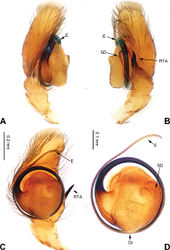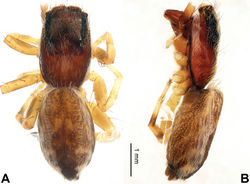Afraflacilla ballarini
| Notice: | This page is derived from the original publication listed below, whose author(s) should always be credited. Further contributors may edit and improve the content of this page and, consequently, need to be credited as well (see page history). Any assessment of factual correctness requires a careful review of the original article as well as of subsequent contributions.
If you are uncertain whether your planned contribution is correct or not, we suggest that you use the associated discussion page instead of editing the page directly. This page should be cited as follows (rationale):
Citation formats to copy and paste
BibTeX: @article{Cao2016ZooKeys, RIS/ Endnote: TY - JOUR Wikipedia/ Citizendium: <ref name="Cao2016ZooKeys">{{Citation See also the citation download page at the journal. |
Ordo: Araneae
Familia: Salticidae
Genus: Afraflacilla
Name
Afraflacilla ballarini Cao & Li sp. n. – Wikispecies link – ZooBank link – Pensoft Profile
Type
Holotype ♂: CHINA, Yunnan, Mengla County, Menglun Town, rubber plantation (21°54.684'N, 101°16.319'E, 585 m), 7 March 2006, G. Zheng leg.
Etymology
The new species is named after Francesco Ballarin (IZCAS) for his study on the spiders of Asia; noun (name) in genitive case.
Diagnosis
The male resembles Afraflacilla grayorum Żabka, 1993 (Żabka 1993[1]: figs 7A–D, 8A–C) by having similar embolus (Fig. 1C–D) and body shape (Fig. 2), but differs in the shape of the tegulum (Fig. 1D) and embolus set at nine o’clock vs. six o’clock in Afraflacilla grayorum. Also, the course of the seminal duct and tegular protrusion are in different positions (six o’clock vs. four o’clock in Afraflacilla grayorum). The tibial apophysis lacks a dorsolateral protrusion (vs. this character in Afraflacilla grayorum) (Fig. 1B).
Description
Male (holotype). Total length 3.85, CL 1.85, CW 1.20, AL 2.00, AW 1.40. Eye measurements: AME 0.32 ALE 0.18 PME 0.08 PLE 0.15; AER 1.00, PER 1.00, EFL 0.85. Clypeus 0.12 high. Legs: I 3.58 (1.05, 0.70, 0.85, 0.60, 0.38); II 2.31 (0.78, 0.33, 0.50, 0.40, 0.30); III 2.60 (0.80, 0.35, 0.55, 0.50, 0.40); IV 3.34 (1.00, 0.50, 0.75, 0.64, 0.45).
Carapace brown with grey and white hairs (Fig. 2A). Sides and clypeus with white marginal band. Ocular area dark brown. Chelicerae and labium brown. Maxillae brown with white tips. Sternum greyish brown. Abdomen oval, brownish, anterior and sides with white hairs. Venter and spinnerets dark brown. Leg I more robust and darker than the other legs, which are yellowish. Spination of leg I: femur d2-1-1; tibia p0-1-0, metatarsus v2-0-2. Palpal tibia short, about 1/3 length of cymbium. Cymbial tip about 1.5 times as long as tibia. RTA pointed, subequal to the length of the tibia (Fig. 1B). Bulb oval, with blunt outgrowth and posterior protrusion (Fig. 1D). Seminal duct with loops. Embolus elongate, starting at nine o’clock and coiled more than once around the bulb (Fig. 1C).
Female. Unknown.
Distribution
Known only from the type locality.
Original Description
- Cao, Q; Li, S; Żabka, M; 2016: The jumping spiders from Xishuangbanna, Yunnan, China (Araneae, Salticidae) ZooKeys, (630): 43-104. doi
Images
|
Other References
- ↑ Żabka M (1993) Salticidae (Arachnida: Araneae) of the Oriental, Australian and Pacific regions. IX. Genera Afraflacilla Berland & Millot 1941 and Evarcha Simon 1902. Invertebrate Taxonomy 7: 279–295. doi: 10.1071/IT9930279


